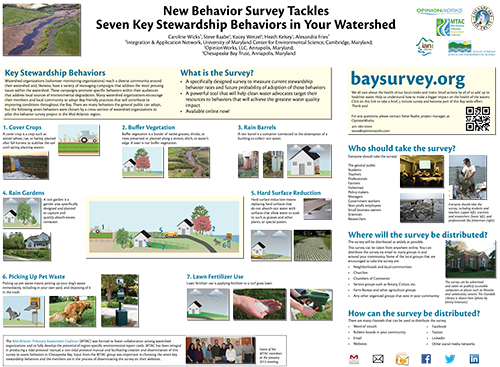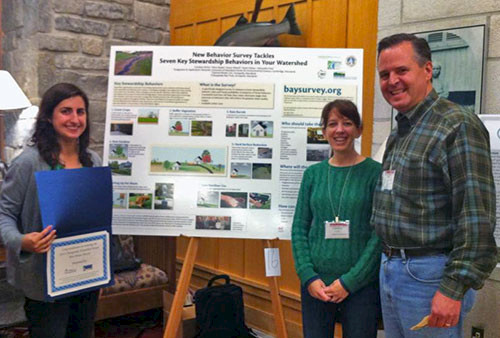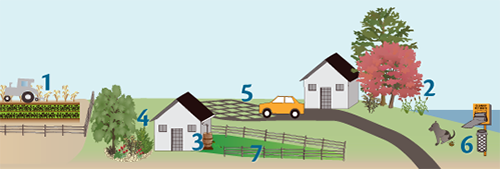Take the baysurvey!: Learning about stewardship behaviors for Chesapeake Bay restoration
Bill Dennison · | Science Communication |The Integration and Application Network has teamed up with Opinion Works LLC, an Annapolis based group of researchers interested in understanding behaviors related to environmental policies. This effort is funded by the Chesapeake Bay Trust, and is part of the effort by the Mid-Atlantic Tributary Assessment Coalition of various watershed groups to effect better watershed stewardship. As part of this collaboration, we have designed an online survey that employs a smart system in which the initial answers provide a guide to the ensuing questions. This type of 'adaptable survey' avoids having the participants answer questions that are not relevant to their situation.

As part of the survey launch, Caroline Wicks, Alexandra Fries, and Heath Kelsey collaborated with Steve Raabe from Opinion Works and Kacey Wetzel from the Chesapeake Bay Trust to produce a poster for the Chesapeake Watershed Forum at the National Conservation Training Center in West Virginia. The poster won first place at the Forum!

Watershed organizations reach a diverse community around their respective watersheds and develop various conservation messaging campaigns to address the pressing issues within the watershed. These campaigns promote specific behaviors to address environmental degradation. There are many potential behaviors, but we have selected seven specific behaviors to target in the Mid-Atlantic region:
- Cover crops; A crop such as winter wheat, barley, rye or barley planted after fall harvest of the commodity crop like corn or soybean to stabilize the soil and absorb nutrients until the spring planting season.
- Buffer vegetation; A border of native grasses, shrubs or trees (not lawn grass) along a stream, ditch of water's edge used to intercept sediments and nutrients.
- Rain barrels; A container connected to the downspout of a building to collect rain water, reducing stormwater flow and providing water for gardening during droughts.
- Rain gardens; A garden area specifically designed and planted to capture and quickly absorb excess rainwater.
- Hard surface reduction; Replacing hard surfaces that do not absorb rainwater with surfaces that allow water to soak in, such as grasses or special pavers.
- Picking up pet waste; Picking up your dog's waste immediately, including in your own yard, and disposing of it in the trash.
- Lawn fertilizer use; Applying fertilizer to a turf grass lawn to avoid runoff of nutrients into stormwater.

The survey is specifically designed to measure current stewardship behavior and future probability of adoption of those behaviors. The results of the survey will help clean water advocates target their resources to behaviors that will achieve the greatest water quality impact. The survey is available online and only takes about 5 minutes. Fill out the survey today at baysurvey.org.
About the author
Bill Dennison

Dr. Bill Dennison is a Professor of Marine Science and Vice President for Science Application at the University of Maryland Center for Environmental Science.